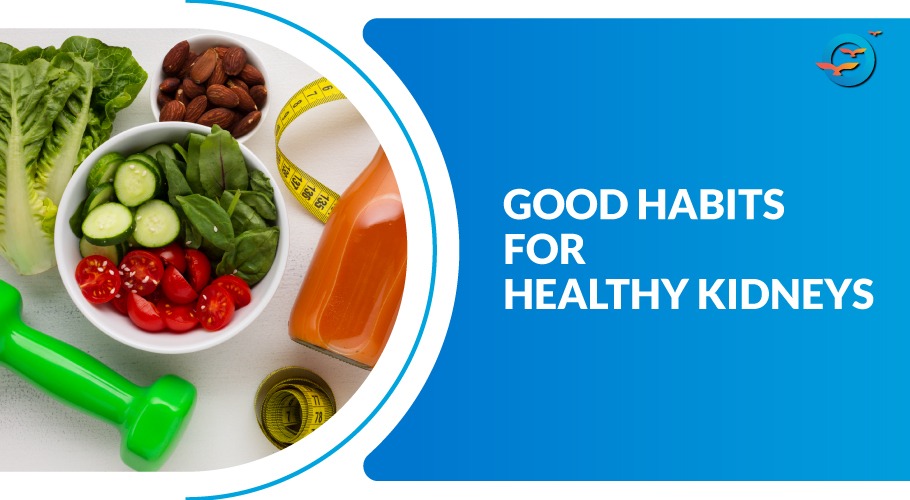Simple Habits to Keep Your Kidneys Healthy
Our kidneys are silent workers that play a vital role in keeping our bodies healthy. They act as natural filters, removing waste and extra fluids from the blood, maintaining the right balance of minerals, and helping control blood pressure. Despite their importance, we often overlook kidney care until a problem arises. The good news is that developing a few simple, healthy habits can go a long way in protecting your kidneys and preventing disease.
Let’s explore some easy, effective ways to keep your kidneys in great shape.
1. Stay Hydrated – Water Is Your Kidney’s Best Friend
Water helps your kidneys do their main job — flushing out toxins and waste through urine. It also prevents the formation of kidney stones and urinary tract infections. When your body is dehydrated, your kidneys have to work harder, which can increase the risk of damage over time.
A good goal is to drink at least 8 cups (2–2.5 liters) of water each day. However, your needs may vary depending on your activity level, climate, and health conditions. If you sweat a lot or live in a hot place, increase your water intake.
Tip: Keep a water bottle with you and take small sips throughout the day instead of drinking large amounts all at once.
2. Eat a Balanced, Kidney-Friendly Diet
What you eat has a direct effect on your kidney health. A balanced diet full of fruits, vegetables, whole grains, lean proteins, and healthy fats supports kidney function and reduces the risk of chronic diseases like diabetes and high blood pressure — two leading causes of kidney problems.
- Choose fresh and unprocessed foods over packaged or fast food.
- Limit salt intake, as excess sodium can raise blood pressure and strain your kidneys.
- Include foods rich in antioxidants, such as berries, spinach, and bell peppers.
- Eat moderate amounts of protein — too much animal protein can put extra stress on your kidneys.
Healthy eating doesn’t have to be restrictive; it’s all about balance and portion control.
3. Keep Your Blood Pressure Under Control
High blood pressure is one of the biggest threats to kidney health. When blood pressure remains high for too long, it can damage the tiny blood vessels in your kidneys, making it harder for them to filter waste effectively.
Monitor your blood pressure regularly, especially if you have a family history of hypertension.
To maintain healthy levels:
- Reduce salt and processed food consumption
- Stay active
- Maintain a healthy weight
- Manage stress with yoga or meditation
If your blood pressure is consistently high, consult your doctor for proper medication and lifestyle guidance.
4. Manage Blood Sugar Levels
People with diabetes need to pay extra attention to kidney health. High blood sugar levels can damage the blood vessels in the kidneys, leading to a condition called diabetic nephropathy.
To keep your kidneys safe:
- Monitor your blood sugar regularly
- Follow a diabetes-friendly diet
- Stay physically active
- Take medicines or insulin as prescribed
Even if you don’t have diabetes, limiting sugary foods and refined carbs is beneficial for long-term kidney and overall health.
5. Be Careful with Painkillers and Medications
Many common painkillers, like ibuprofen, naproxen, or aspirin, can harm your kidneys if taken too frequently or in high doses. These drugs can reduce blood flow to the kidneys and cause damage over time.
Always use such medicines under medical advice, and avoid self-medicating. If you deal with chronic pain, ask your doctor about safer alternatives or natural pain relief options.
6. Stay Active – Exercise for Kidney Health
Regular physical activity supports kidney health by improving heart function, blood circulation, and body weight management. Exercise also helps lower blood pressure and reduce stress — both beneficial for your kidneys.
You don’t need to do intense workouts; even 30 minutes of brisk walking, yoga, cycling, or swimming on most days can make a big difference.
The goal is consistency — find an activity you enjoy and make it part of your daily routine.
7. Limit Alcohol and Avoid Smoking
Both alcohol and smoking can harm your kidneys. Excessive alcohol intake increases blood pressure and adds extra toxins that kidneys must filter out. Smoking, on the other hand, narrows blood vessels and reduces blood flow to your kidneys, accelerating damage.
If you drink, do so in moderation — no more than one drink a day for women and two for men. And if you smoke, consider seeking help to quit. Your kidneys (and your entire body) will thank you.
8. Go for Regular Health Checkups
Early detection is the best protection. Get your kidney function tested at least once a year, especially if you have diabetes, high blood pressure, or a family history of kidney disease.
Simple blood and urine tests can reveal how well your kidneys are working and help catch any issues early when they’re easier to treat.
Conclusion: Protect Your Kidneys, Protect Your Health
Your kidneys quietly support your health every single day — filtering blood, balancing fluids, and removing waste. By adopting these simple daily habits, you can protect them from damage and ensure they stay healthy for years to come.
Start today by drinking enough water, eating mindfully, staying active, and managing your blood pressure and sugar levels. Small, consistent actions can make a huge difference in your long-term kidney health.
For more helpful insights, read our detailed blog post:
https://www.freedomfromdiabetes.org/blog/post/maintaining-good-habits-for-healthy-kidneys/3577



